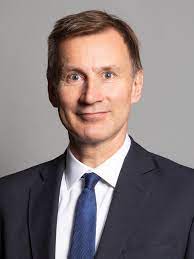Chancellor Jeremy Hunt has delivered his Spring Budget.
The Chancellor said growth had been higher in the UK since 2010 than every other European economy.
But future growth would not come from mass immigration.
He promised a Budget for future growth.
Inflation had been halved to 4%. It was 11% when the Chancellor and the Prime Minister took office.
He said the OBR (Office for Budget Responsibility) forecasts show inflation falling below the 2% target in a few months time – a year earlier than forecast in the Autumn Statement.
Debt would fall to below to 94% by 2028 and 2029, down from over 100%.
Freeze in alcohol duties to be extended to 1 February 2025 to help pubs and bars and the hospitality and drinks industries.
Fuel duty frozen for another 12 months, saving the average motorist £50 a year.
The higher rate of Capital Gains Tax (CGT) on residential property reduced from 28% to 24%.
UK had second-lowest government debt in the G7 group of nations.
OBR expects growth to be 0.8% this year and 1.9% next year – higher than previously expected.
UK had grown faster than the economies of France, Italy and Germany and will continue to do so.
UK had been the third most popular country to inward investment behind the US and China.
Full expensing, introduced in the Autumn Statement, to be applied to leased assets.
VAT registration threshold will go up from £85,000 to £90,000.
Nissan, Google and Microsoft were among businesses investing in the UK.
Government's remaining shares in NatWest (a stake of around 31%) will be sold.
New British ISA allowing investments of £5,000 to be introduced to encourage investment in UK equities.
£270m more investment in the advanced manufacturing industries supply chain and alternative fuels, including growing “zero emission vehicle and clean aviation technology”.
40% relief on business rates for film studios and a new tax credit for UK films with budgets of less than £15m.
Defence spending will go up to 2.5% of GDP “as soon as economic circumstances allow”.
£3.4bn to modernise the NHS's IT system which “will unlock £35bn of savings”.
A public sector productivity plan launched.
Increase in Air Passenger Duty (APD) on non-economy flights.
Windfall tax on oil and gas companies profits extended until 2029, raising a further £1.5bn.
Reform of 'non-dom' tax rules to raise £2.7bn. Non-dom-style tax status would remain for individuals for four years after that they would pay UK taxes.
National Insurance (NI) contributions cut by 2p for employees from 6 April. This will reduce NI by 10% to 8% and from 8% to 6% for the self-employed.
Chancellor said this will bring personal taxes “to their lowest level since 1975”.




















